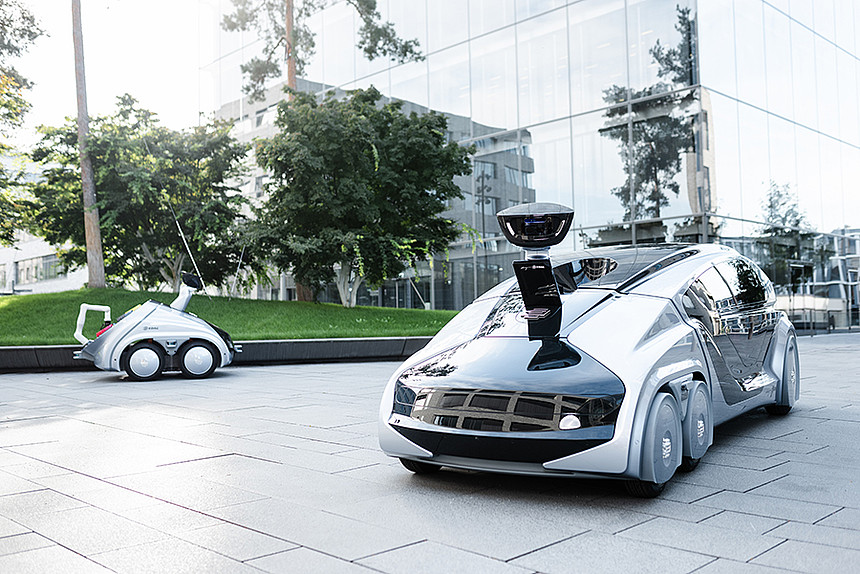


The success story of the "EDAG CityBot" mobility concept continues. Within the context of the "Campus FreeCity" project sponsored by BMDV, development is to continue of the vision of a multifunctional, autonomous fleet of robots for a first practical application in a physical environment. The funding decision was officially handed over by Dr. Michael Güntner, state secretary at BMDV, on 24 November 2021. The project, which is scheduled to run until May 2024, is being sponsored to the tune of € 11 million by BMDV within the scope of the action plan "Digitalisation and Artificial Intelligence in Mobility". House of Logistics and Mobility (HOLM) GmbH, the consortium leader, is in charge of the
overall project management, and acting as the content-related and organisational interface of the consortium. Besides HOLM GmbH and EDAG Engineering GmbH, other project partners are EintrachtTech GmbH, T-Systems International GmbH, COMPREDICT GmbH, DEKRA Automobil GmbH, the University of Fulda, and the Technical University of Darmstadt.
"In 2019, with the CityBot mobility concept developed by EDAG, we presented a concept for making urban mobility more connected, more efficient and more sustainable. Following the presentation of the first fully automated AI technology carrier in 2020, we are delighted that, with the "Campus FreeCity" project, we will reach the next milestone in its technical further development and practical use," explains Cosimo De Carlo, CEO of the EDAG Group. In the course of the project, the EDAG Group will for the first time ever network two additional intelligent, modular robot vehicles – the "EDAG CityBots". These are two interchangeable transport and conveyance modules, developed and produced by the globally operating engineering service provider. This means that the EDAG Group is providing the complex core of the real lab installation.
"We can put our skills in the development of autonomous vehicles, AI solutions, software and digitalisation and classic vehicle engineering to optimum use in the project. A fascinating project and one in which our project management team in Fulda will be involving our EDAG specialists worldwide. Apart from the technical challenge, what particularly motivates us is the fact that we will be making a sociopolitical contribution with this funded project, to make our cities quieter, cleaner, more life enhancing and smarter in the future," adds Cosimo De Carlo.
Using "EDAG CityBot" vehicles developed by the EDAG Group, the project is carrying out laboratory-scale research into the challenges posed by and possible solutions for our previously uncoordinated urban transport. Urban transport is characterised by high traffic density, congestion, local emissions and the use of large areas of land. Its transport potential is neither coordinated nor fully exploited.
The interdisciplinary "Campus FreeCity" project is researching the challenges posed by and possible solutions for inner-city traffic problems using two "EDAG CityBot" vehicles which, in the course of the project, will be developed for the transport of passengers and goods, then implemented, operated and scientifically analysed in the laboratory. The laboratory development enables various topics relevant to future mobility and logistics systems be explored under realistic conditions. These include networked, automated driving functions, networking and data exchange, human-machine communication, acceptance and trust, integrated order management and the identification and realisation of economic and technical optimisation potentials in operation.
"This project is examining a completely new type of mobility and logistics system, and is therefore making a definite contribution to the transformation of transport. In the long term, it offers an all-round, sustainable approach to solving inner-city traffic problems," says Michael Kadow, CEO of HOLM GmbH, adding: "We are therefore proud to be coordinating this process, and to be promoting ground-breaking industrial research and development in cooperation with our project partners. As a development and networking platform, we also see this project as a chance to increase awareness for new, intelligent and networked mobility concepts."
More Information on the Campus Free City project.
EintrachtTech GmbH from Frankfurt am Main is providing the spatial infrastructure for the real lab at the Deutsche Bank Park site, and, in cooperation with the other partners, is working on relevant use cases to develop the user requirements and underlying user journeys, taking the scaling in the urban area into account.
T-Systems International GmbH from Frankfurt am Main has taken on the research into technical approaches, process and operational procedures for remote operation and the technical supervision
of automated vehicles
COMPREDICT GmbH from Darmstadt is responsible for the measurements needed to train the virtual sensors and predict component breakdowns.
DEKRA Automobil GmbH from Klettwitz analyses future requirements for the approval of new mobility concepts, incorporates new findings into the new and further development of regulations, and develops the test procedures required to secure safe operation.
The University of Fulda is responsible for supply chain modelling, the process model, and for the co-development of planning algorithms.
And the Technical University of Darmstadt is responsible for the scientific guidance and identification of further efficiency potentials with regard to the design and operation of the drivetrain for the CityBots.
In addition to the consortium, FES Frankfurter Entsorgungs- und Service GmbH has also joined the project as an associated project partner.